E. & H.T. Anthony & Co.
Novelette View Variation 1.0 Square Front
Illustrated Catalogue of Amateur Equipments
and Materials, E. & H.T. Anthony & Co.
(New York, NY), September 1886, p. 14
The same engraving was used for the
Anthony Novel View Variation 2 in various
sources from 1884-1891; apparently they didn't want to create a specific
Novelette Square Front image. The Novelette never had the thick,
complicated ground glass frame shown in this engraving.
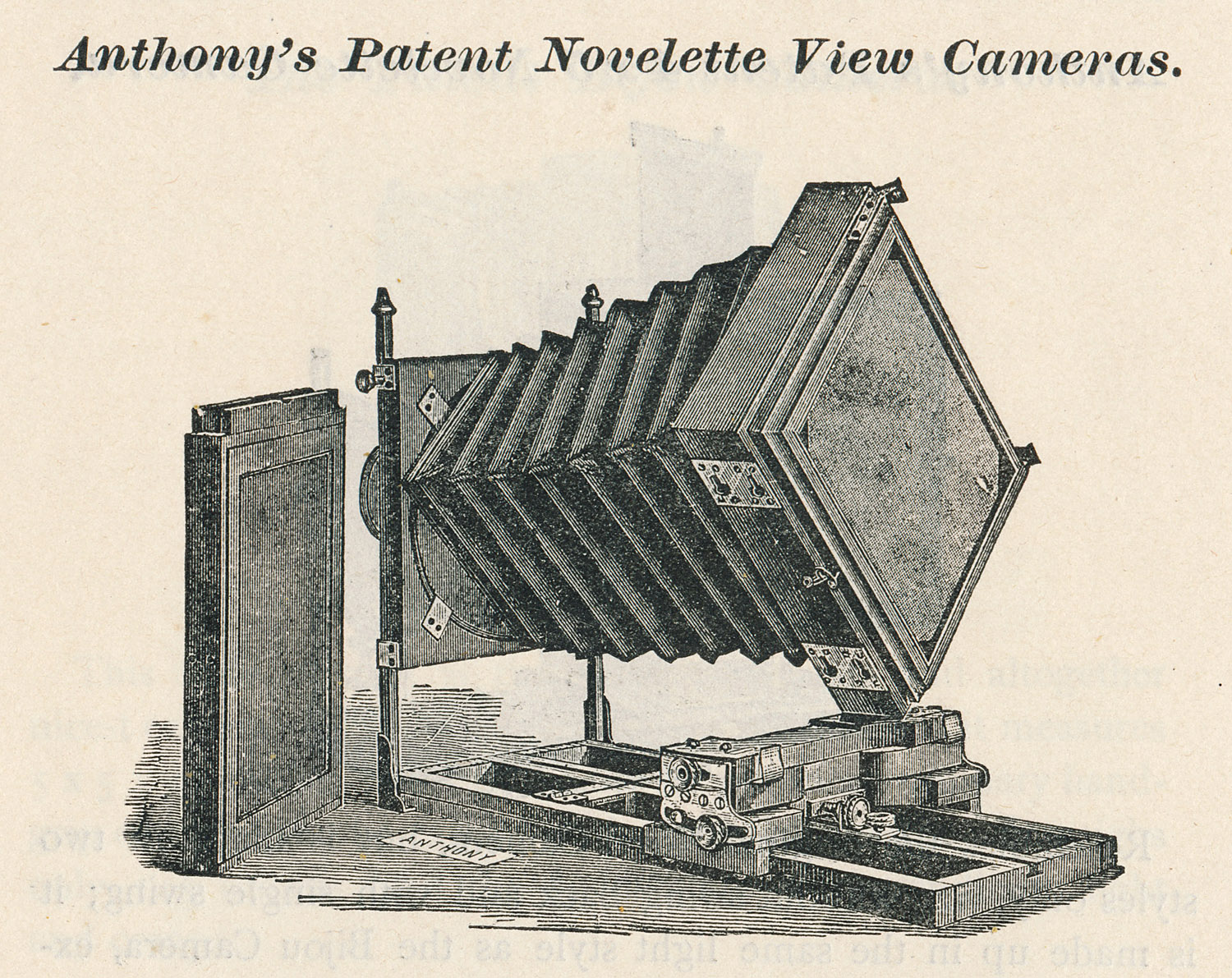
Examples on this page:
1)
5x7",
square
front
2)
8x10"
square front, non-stereo, with extra separate extension for long bellows
work
5x7", square front
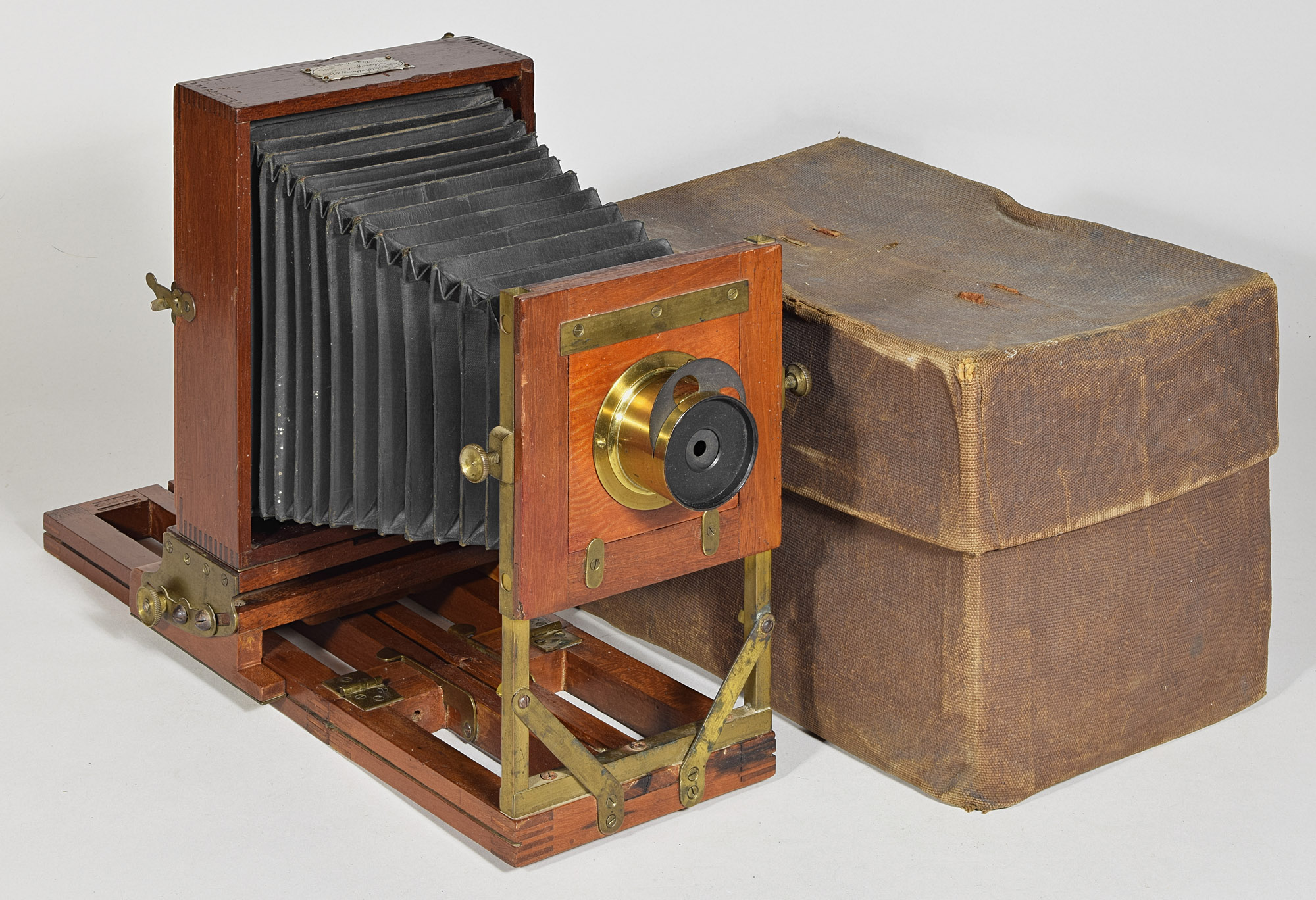
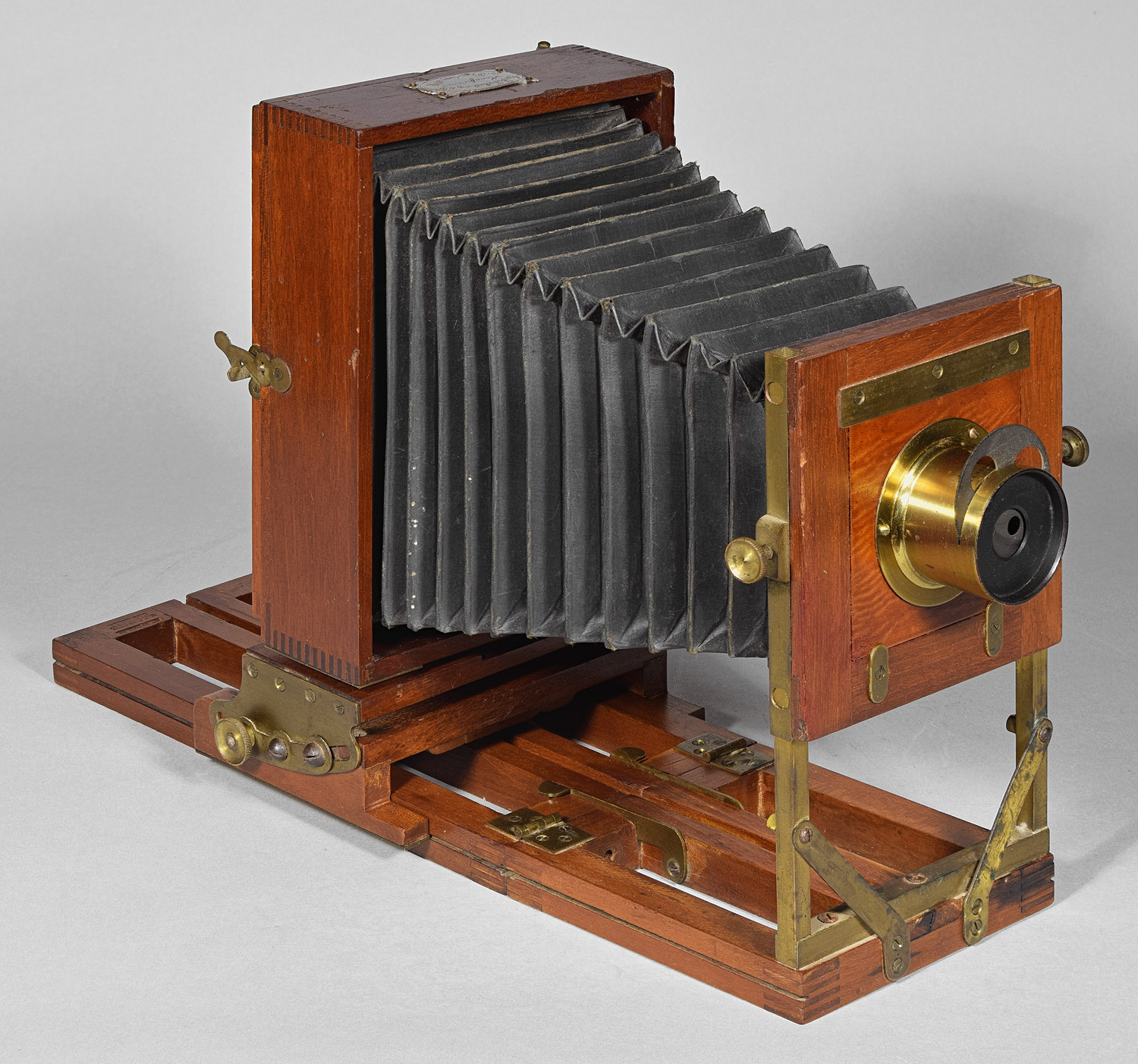
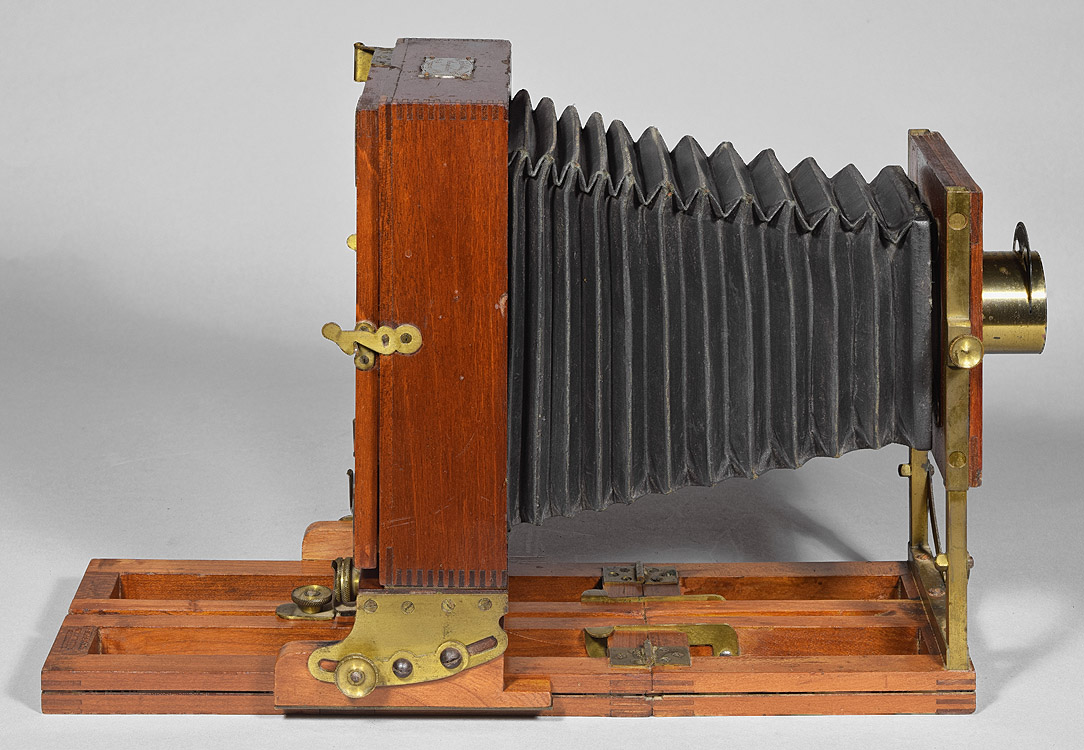
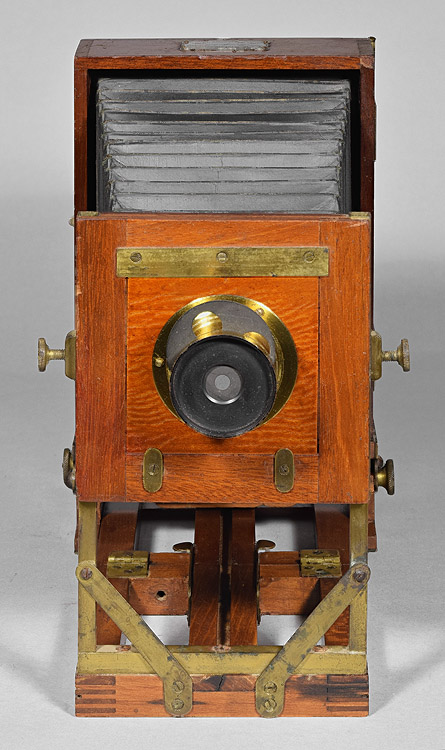
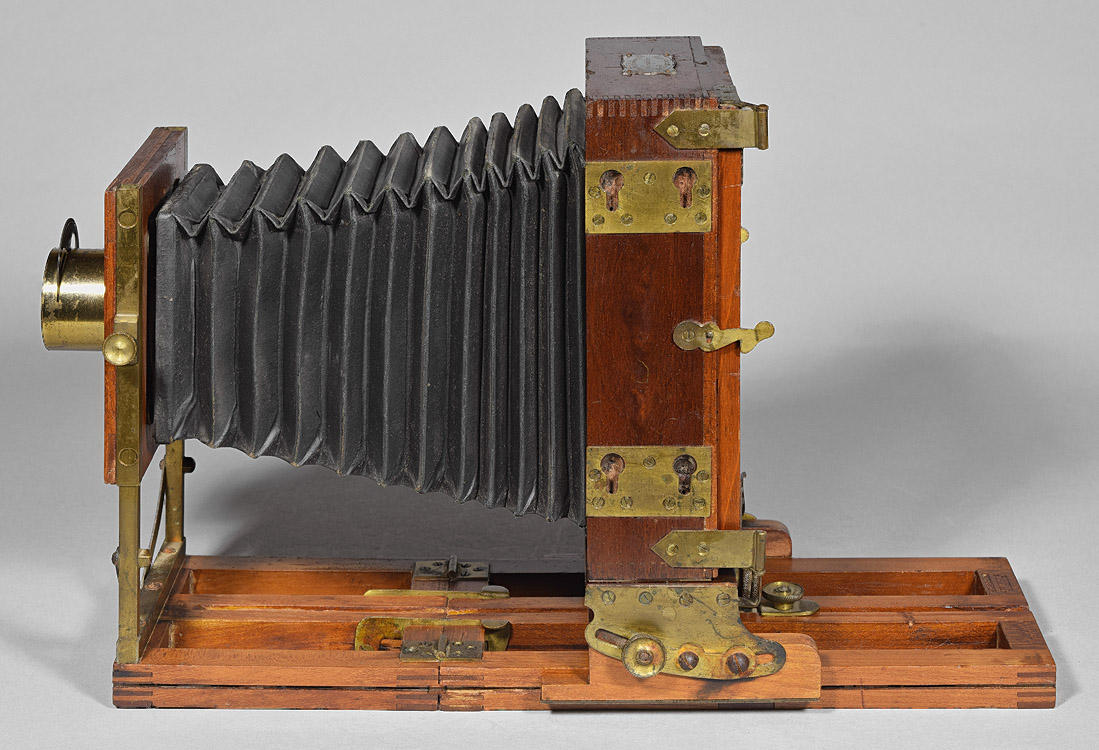
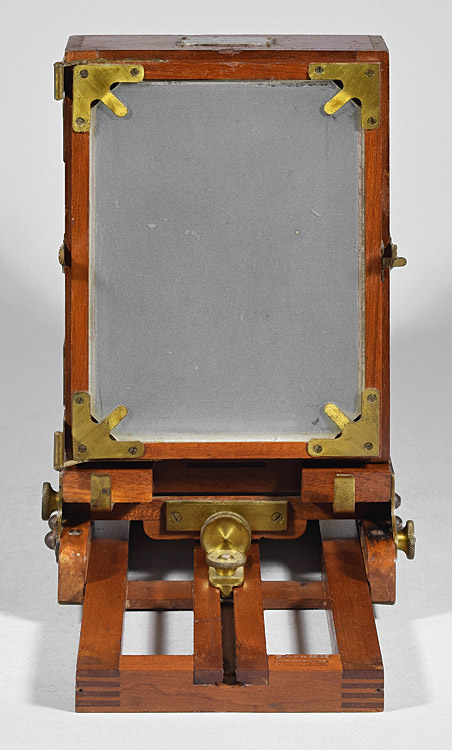
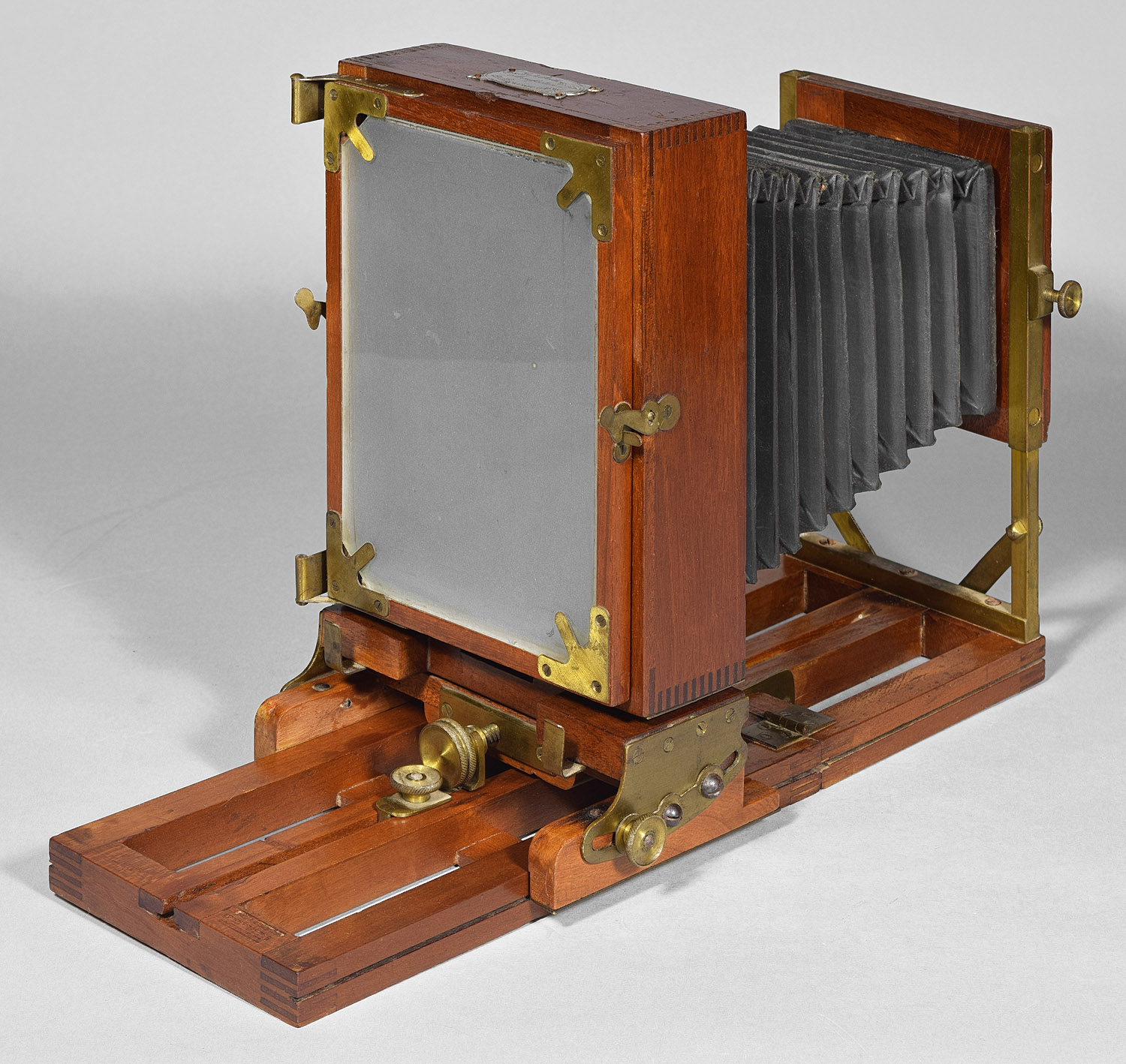
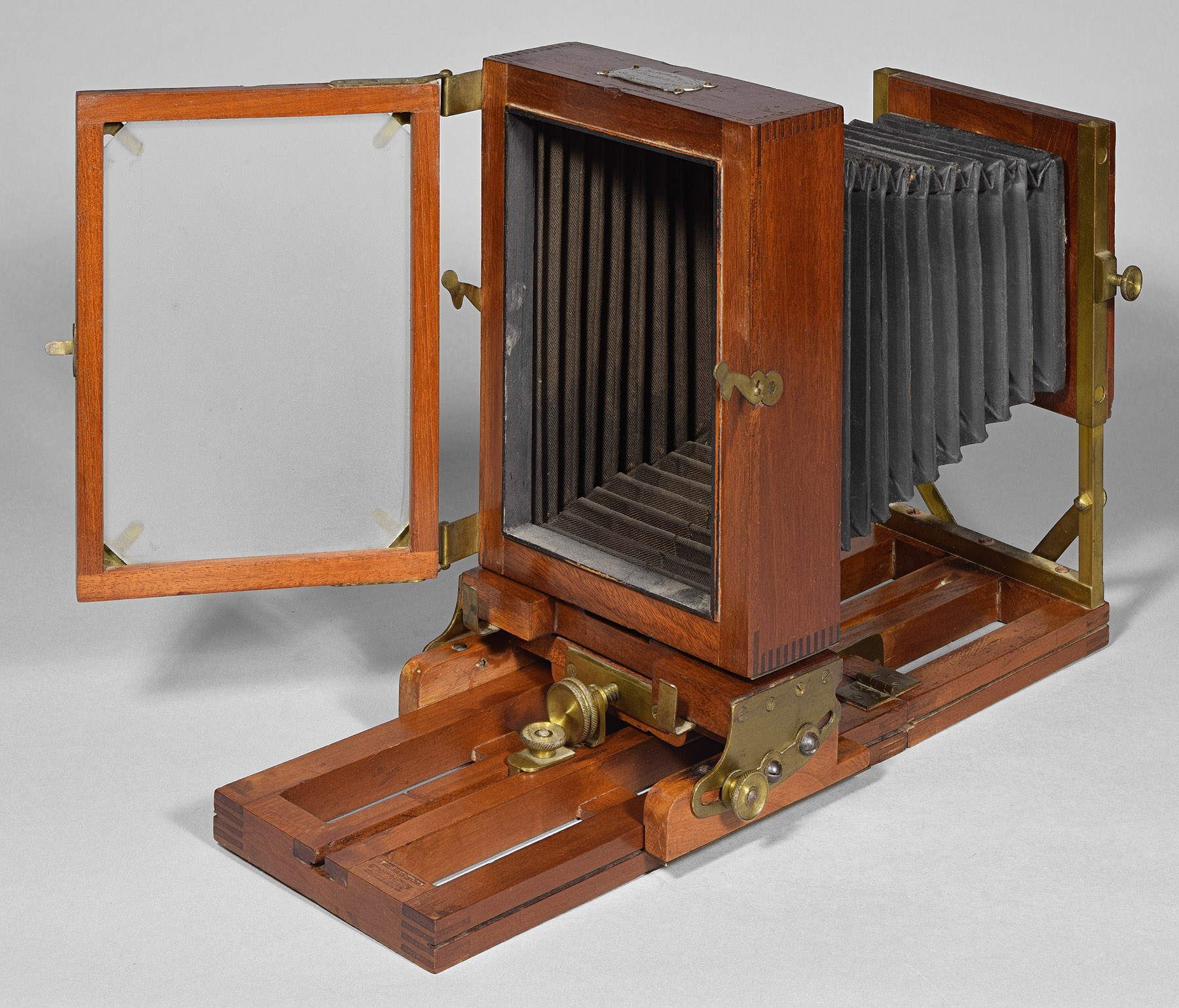
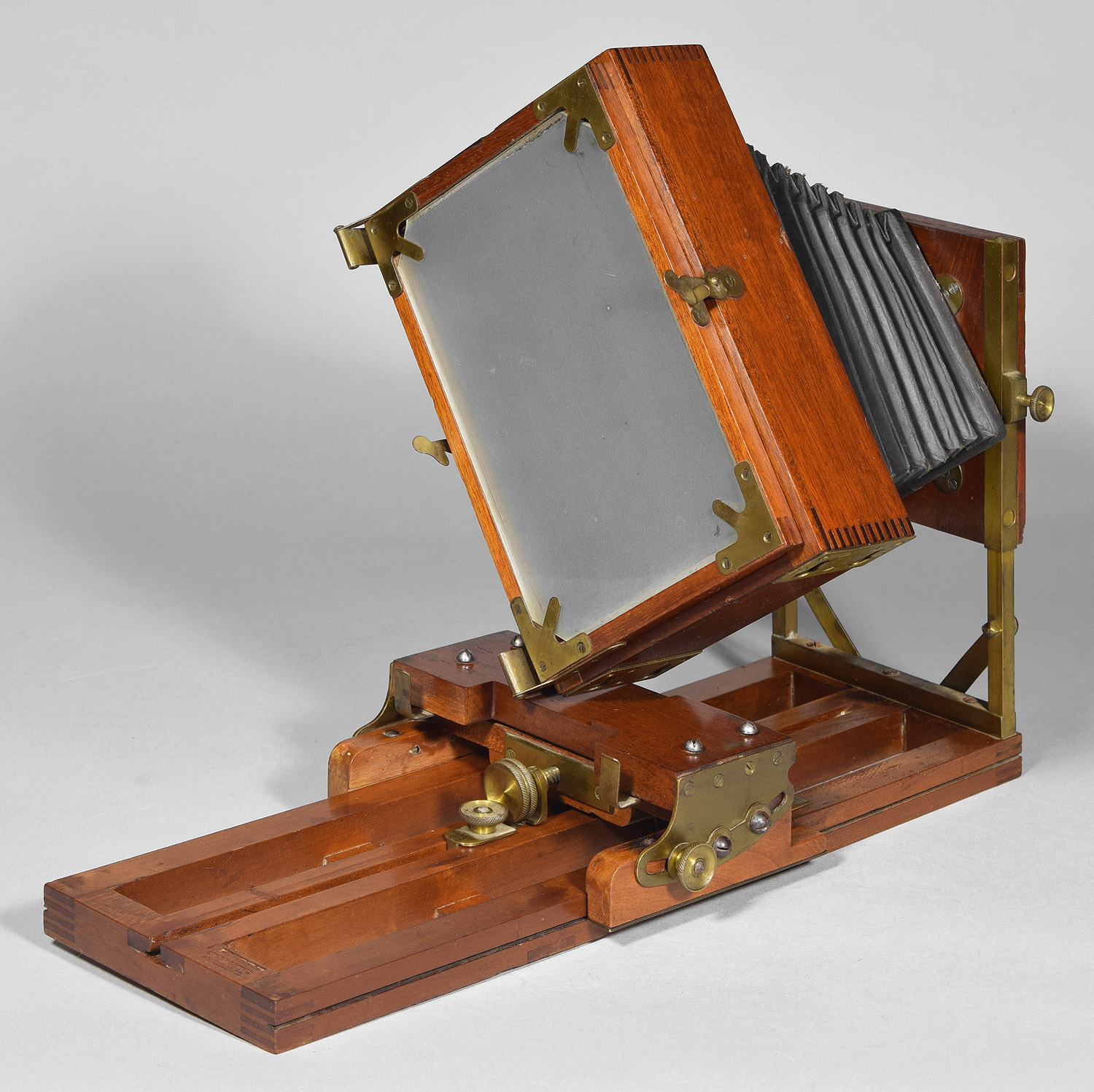
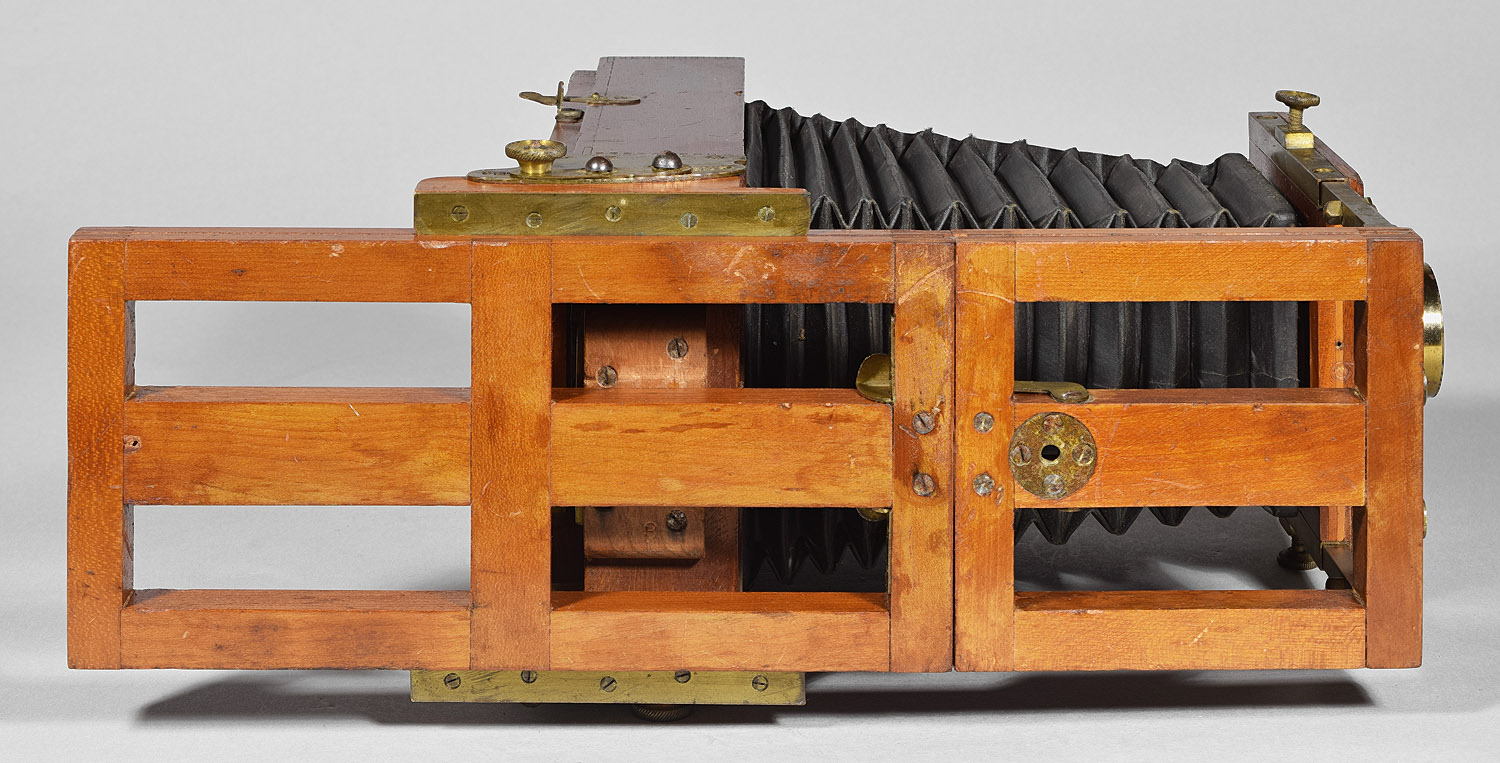
Label, top of rear standard
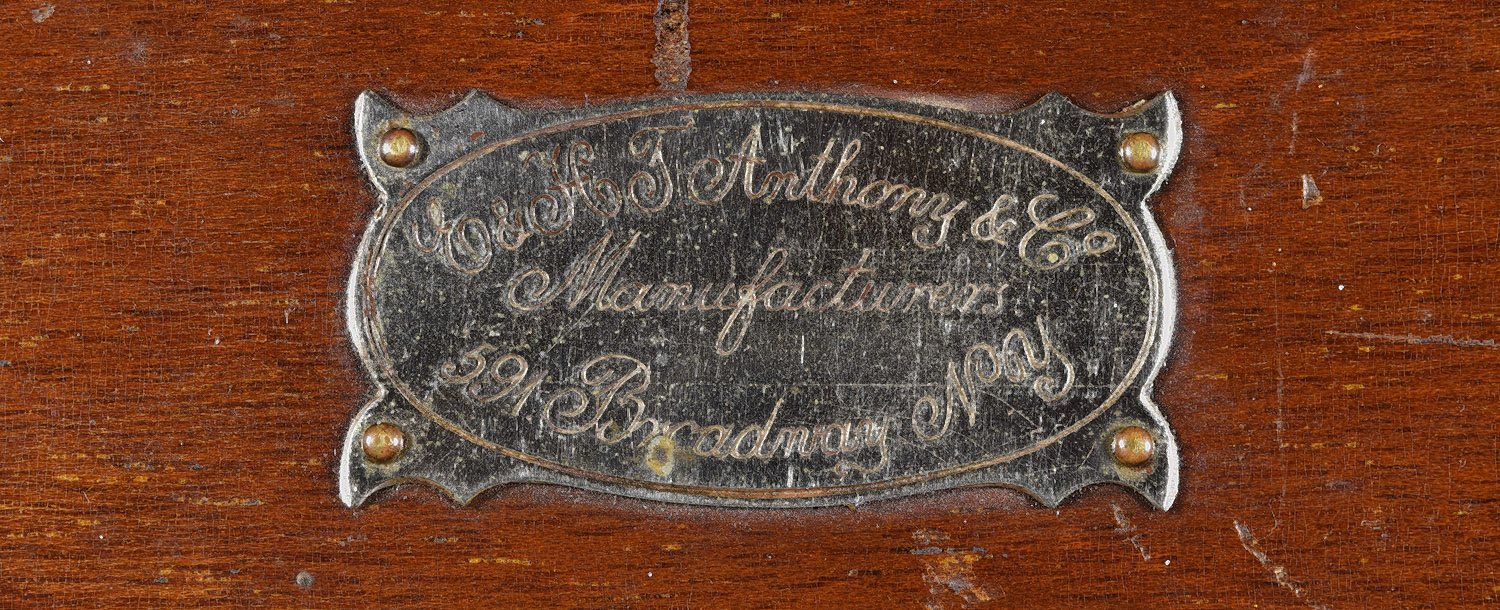
Patent stamps, rear of
platform frame:
8x10" square front, non-stereo, with extra
separate extension for long bellows work
Date Introduced:
- ; Years
Manufactured: c.1886 - 1897
Anthony Novel
models and Novelette models share the characteristic that they
all have bellows that rotate along with the rear standard, except for
Novel Variation 1.0. Novels
are generally more robust (read: heavier) than Novelettes,
For example, Novels have a ground glass frame that is about 1
inch wide, whereas Novelettes have a ground glass frame that is
only about 1/2 inch wide.
There are
three
main
variations
of Novelette and two
sub-variations of Variation 1. Their basic
focusing, tilt, and rise mechanisms are also the same throughout.
Their differences are in the platform design, and, in the case of the
sub-variations, whether they have a round or square front.
Novelette Variation 0.5:
has a frame-type platform constructed of solid cherry. The
rigidity of the base is supplied by shifting a large brass plate
backwards until it lodges half on the main part of the platform and half
on the rear platform extension. This type of mechanism seems to be
confined to the smallest examples of
Novelettes, e.g., 4x5.
It is too bad this mechanism wasn't used for larger cameras, as it
generally supplies a tight fit and flat platform, even after 120 years,
a claim that cannot be made for Anthony's patent hooks used in the other
variations.
Novelette Variation 1.0 Round
Front: Variation 1 has
a frame-type platform construction, and differs from Variation 0.5 only
in that the platform is made rigid by use of Anthony's patent platform
hooks, one on each side of said platform. They have the advantage
over, say, a thumbscrew, by being very quick. They have the
disadvantage of tending to loosen over time, which, given the inevitable
pull from the bellows, makes the rear platform extension have a slight
angle to the main platform. This really doesn't affect the process
of taking a photo through the camera, but it does present a problem to
someone like me documenting what the camera looks like while trying to
make various planes of the camera end up parallel in said photo.
The difference between the Round Front Variation and the Square Front
Variation is the shape and size of the front standard.
Novelette Variation 1.0
Square Front: The
difference between the Round Front Variation and the Square Front
Variation is the shape and size of the front standard. The
Square
Front Variation has about the smallest (and yes, square) front standard
that can accommodate a single lens. The bellows tapers down
sharply from the rear standard to this small front standard. In
contrast, the Round Front Variation is designed to stereo work, and has
a lens board wide enough to accommodate stereo lenses. The bellows
necessarily does not taper as much as in the Square Front Variation, and
also needs more wood in the front standard to allow for the rotating of
the bellows. This extra wood comprises the round parts (top and
bottom) of the front standard.
Novelette Variation 2.0: has a
solid plywood base
instead of the frame-type base of the other variations.
Variation 2.0
was described by Christie's
auction house (where it was auctioned) as a "Bicycle Novelette",
and referred to by William Marder in his Anthony book (where it was
illustrated) as "early". The
Anthony Bicycle Equipment
(a 3¼x4¼" view camera) actually more resembles the Novelette Variation 0.5
in that both have the shifting brass plate as a way to make the folding
platform rigid and metal tubes to support the front standard.
However, the Bicycle Equipment does not have a revolving bellows, the
claim to fame for all Novels and Novelettes, and therefore cannot be a
Novelette. I suspect that either 1) Bill Marder was correct, and
this variation is a early one, or 2) Variation 0.5 and Variation 2.0 are
merely alternate ways to construct a small format camera such as a
3¼x4¼" or 4x5".
The
tripod screw
of the Novelette
is neatly stored by screwing it into the
bottom of the front standard.
References:
"Pat. Feb. 20, '83" (revolving bellows and the means of attaching the
rear standard)
"Pat. Mar. 28, '82" (bellows that revolve at the front standard)
"C. Feb. 20, '83" (a second reference to Feb. 20, 1883)
Note that a stamp is missing that is on most Anthony cameras, a stamp
stating: "Pat. Nov. 11, '84" (clamp hooks for making the platform rigid
patent), even though this camera has the patent clamp hooks

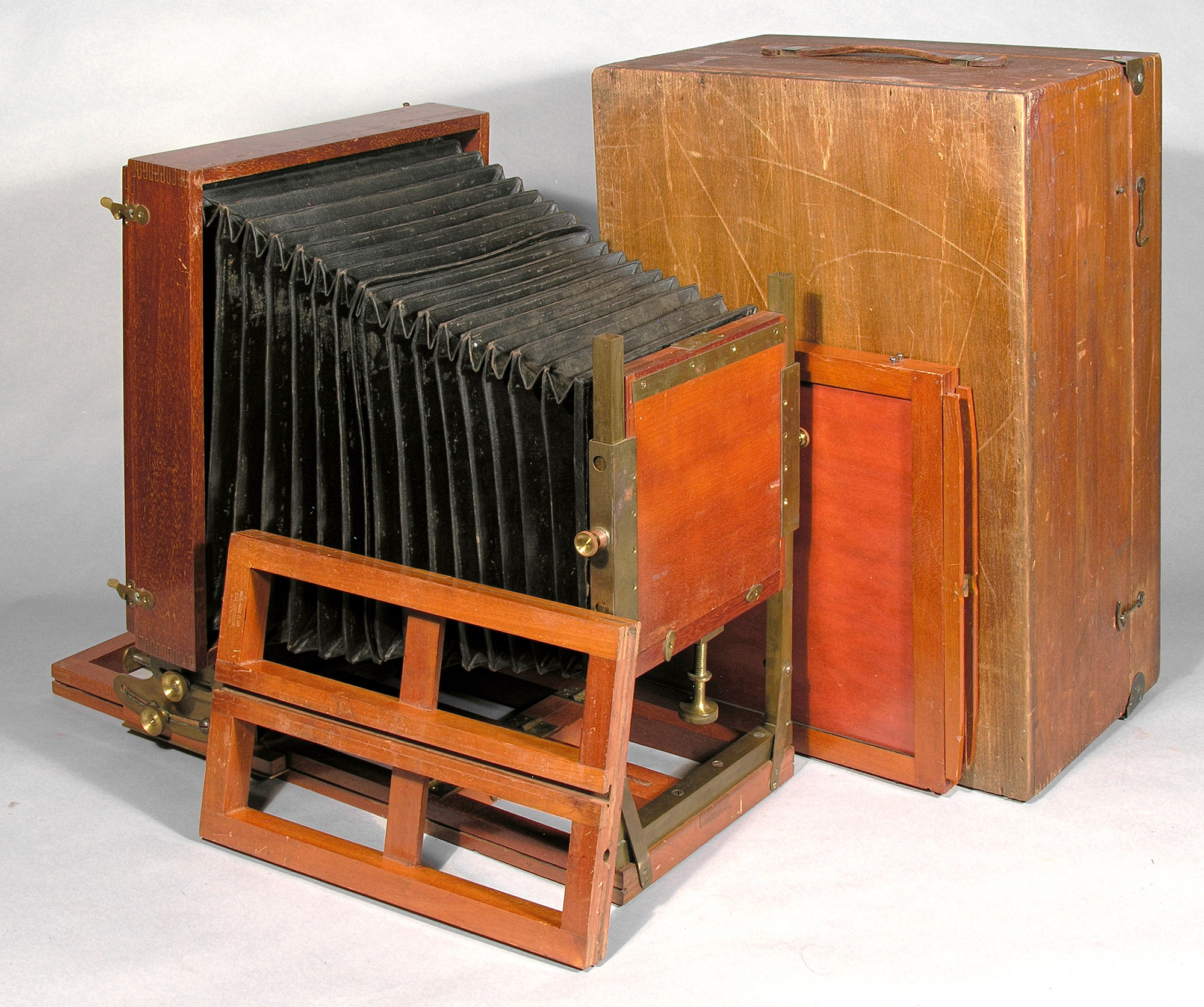
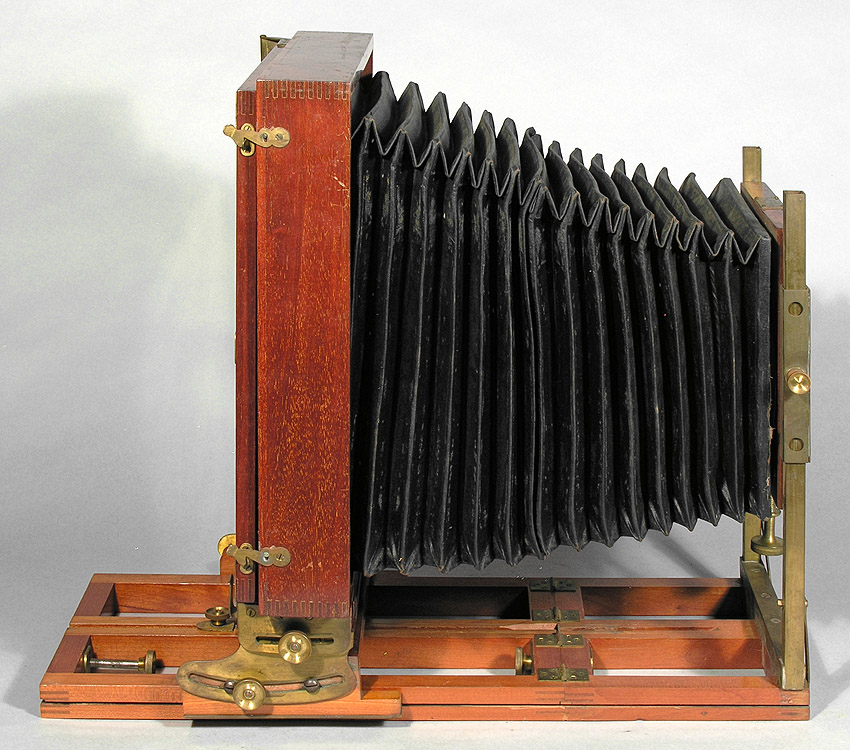
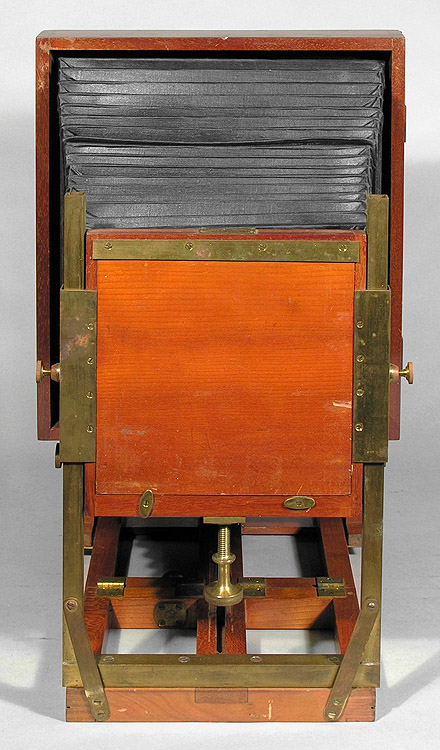
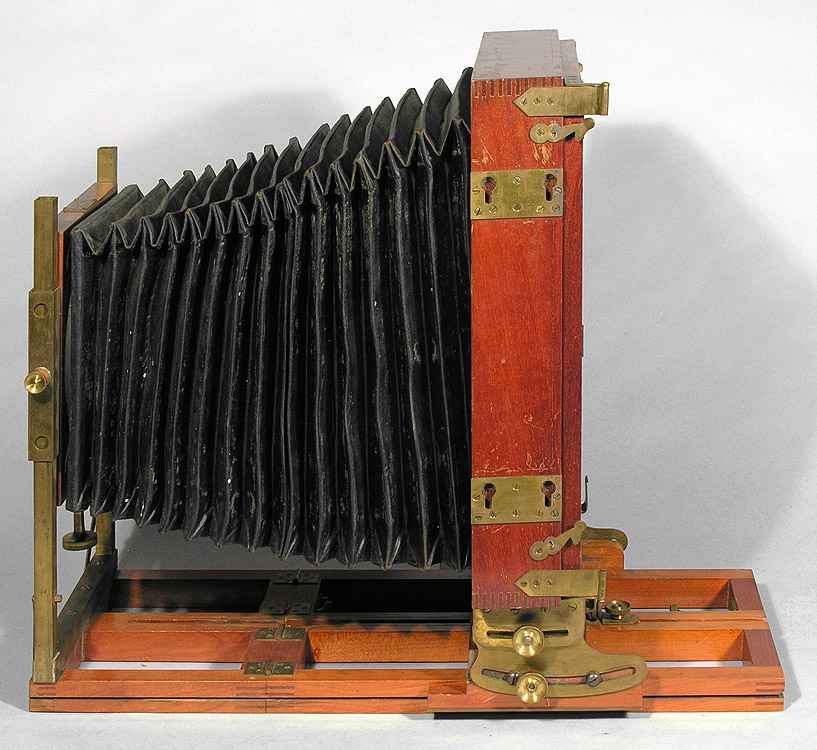
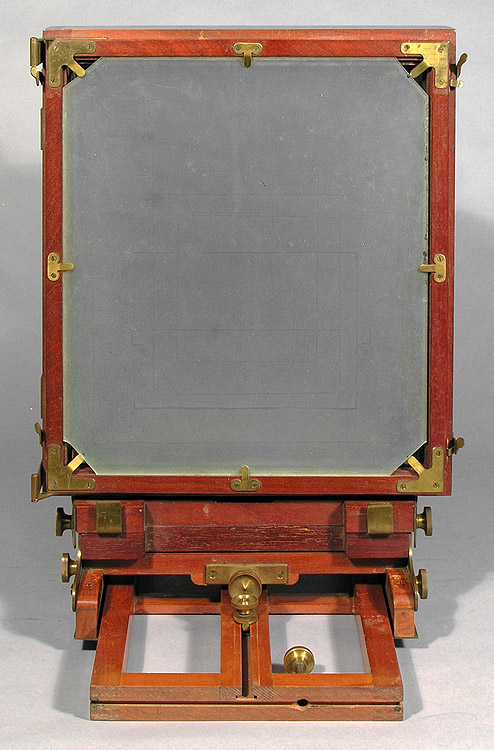
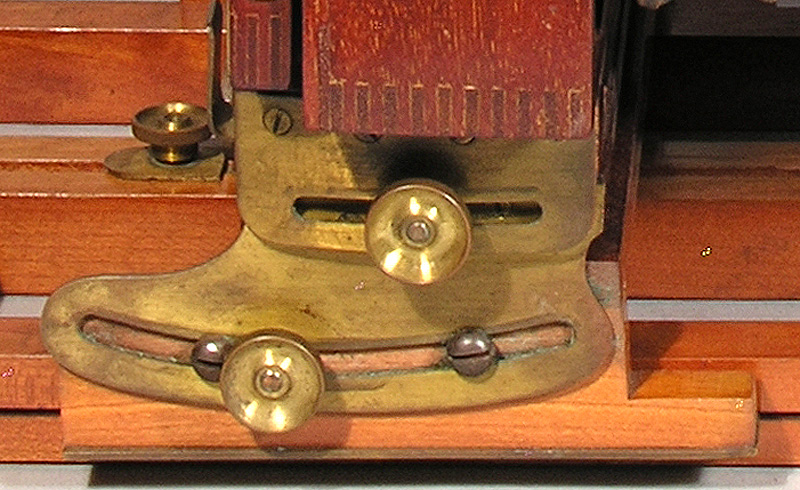
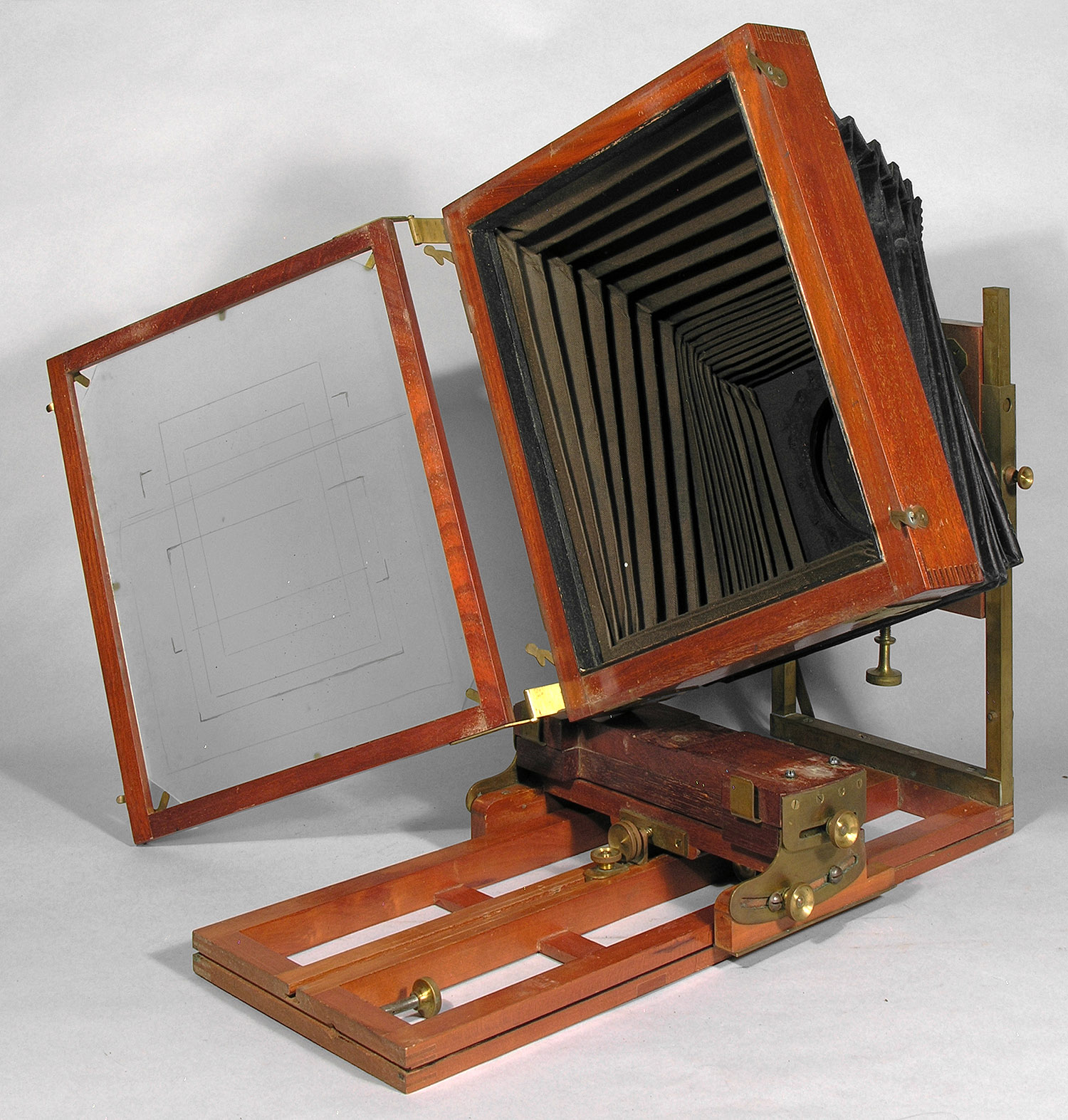
Construction:
rear
focus via push-pull but
with fine-focusing screw; single or
double swing; reversing by rotating bellows and back; plywood lens board
Materials:
mahogany body; cherry base; black fabric bellows; brass hardware
Sizes Offered:
4x5; 4¼x6½; 5x7 (added
"recently" per Feb. 1888 Anthony's Photographic Bulletin),
5x8 (shown); 6½x8½; 8x10; in 1891, add
10x12; 11x14
Notes:
Illustrated Catalogue of Amateur Equipments
and Materials, E. & H.T. Anthony & Co.
(New York, NY), September 1886, pp. 13-15
Anthony's Photographic Bulletin, Vol. 17, No.
18, E. & H.T. Anthony & Co., (New
York, NY), September 25, 1886, p. 10
Illustrated Catalogue of
Amateur Photographic Equipments & Materials,
E.
&
H.T. Anthony
& Co. (New York, NY), August 1887, pp.
14-15
Illustrated Catalogue of
Amateur Photographic Equipments & Materials,
E.
&
H.T. Anthony
& Co. (New York, NY), January 1888,
pp. 14-15
The International Annual of Anthony's
Photographic Bulletin,
Vol. I, 1888,
W. J. Harrison and A. H. Elliot, eds., E. & H. T. Anthony & Co. (New
York, NY),
July 1888, ads p. 72
Anthony's Photographic Bulletin, Vol. 19, No.
4, E. & H.T. Anthony & Co., (New York,
NY), February 25, 1886, ads p. 18 (5x7 "something new", but the
engraving in the ad is actually the
Novel Variation 2)
Illustrated Catalogue of
Amateur Photographic Equipments & Materials,
E.
&
H.T. Anthony
& Co. (New York, NY), January 1889,
pp. 14-15
The International Annual of Anthony's
Photographic Bulletin,
Vol. II, 1889,
W. J. Harrison and A. H. Elliot, eds., E. & H. T. Anthony & Co. (New
York, NY),
ads p. 53
The International Annual
of
Anthony's Photographic Bulletin, Vol. III,
1890-1891,
W. J. Harrison and A. H. Elliot,
eds., E. & H. T. Anthony & Co. (New York, NY), ads
p.
101
Illustrated Catalogue of
Photographic Equipments and Materials for Amateurs,
E. & H.T. Anthony & Co. (New York, NY),
1891, pp. 9-11
How to Make Photographs.
A Manual for Amateurs, C. T. Roche and
H.T. Anthony, E. & H.T. Anthony & Co. (New York, NY), 1892, p. 29
The International Annual of Anthony's
Photographic Bulletin Vol. VI 1894,
edited by A.H. Elliott and F.P. Smith, E. & H.T. Anthony & Co. (New
York, NY), 1893, p. 71 (list of view and other cameras)
Illustrated Catalogue of Photographic
Equipments and Materials for Amateurs,
E. & H.T. Anthony & Co. (New York, NY), September, 1894, p. 13-15
The
International Annual of Anthony's Photographic Bulletin
Vol. VII 1895,E. &
H.T. Anthony & Co. (New York, NY), 1894, ads
p.
99
Illustrated Catalogue of Photographic
Equipments and Materials for Amateurs,
E. & H.T. Anthony & Co. (New York, NY),
January 1895, p. 13-15
Illustrated Catalogue of Photographic
Equipments and Materials for Amateurs,
E. & H.T. Anthony & Co. (New York, NY), August, 1895, p. 15-16
Illustrated Catalogue of Photographic
Equipments and Materials for Amateurs,
E. & H.T. Anthony & Co. (New York, NY), December, 1895, p. 13-15
Illustrated Catalogue of Photographic
Equipments and Materials for Amateurs,
E. & H.T. Anthony & Co. (New York, NY), August, 1896, p. 13-15
Illustrated Catalogue of
Photographic Materials, Thos.
H. McCollin & Co. (Philadelphia, PA)
undated, c. 1897, p.
38-39
not in 1898 or later catalogs
